Russia-Trump: Who's who in the drama to end all dramas?
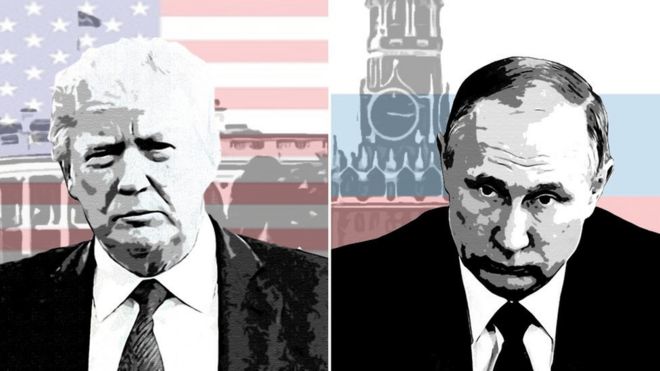
It was more gripping than any box set we could get our hands on.
Over two years, the investigations into Russian interference in the US election, and whether the Trump campaign colluded with the Kremlin, delivered daily developments and drama worthy of anything seen in House of Cards.
In the end, 35 people and three companies were charged by Robert Mueller, the special counsel who investigated Russian interference in the 2016 election.
Here's our guide to the main characters in the four seasons of the only political drama that mattered.
Season One - The Election
This was the season in which Donald Trump, the reality TV star, took centre stage in his own political drama by launching a presidential campaign. He was supported by his family and got the attention of the Russians. The season ended with a cliffhanger - could Trump the outsider actually win?!
It's been a while since all of this happened, so let's remind you of the key players in this season.
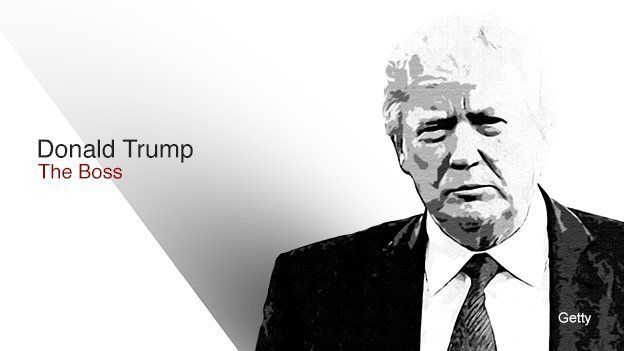
Who was he? Donald Trump, the billionaire candidate (who by Season Three is the 45th president of the United States). If you really need a refresher, here's his life story.
Key plot line As Donald Trump was busy traversing the country canvassing for votes in Season One, Russia hacked into the emails of his Democratic rivals, investigators later said.
The question is why? Was the Kremlin trying to alter the outcome of the election, and what did Trump and his campaign know?
Skip forward to the end of Season Four and Mr Trump stood triumphant before reporters in a Florida airport, celebrating what he called "a complete and total exoneration".
But in between, there was no shortage of drama or tension.
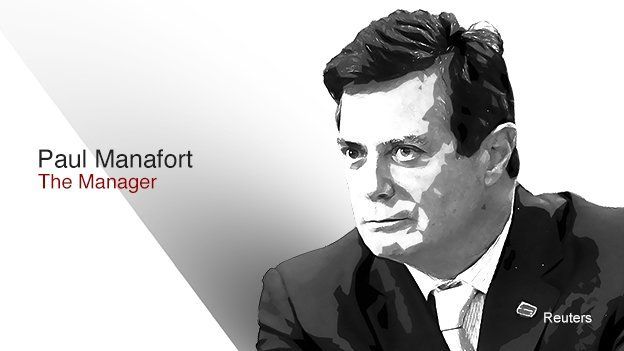
Who was he? He was Trump's campaign chairman before being forced to quit over his ties to Russian oligarchs and Ukraine.
Key plot line He was one of the biggest dominoes to fall. When he ended up being arrested, it was a big season-ending shocker.
Manafort hung around a bit in Season One, but then disappeared from view for a while.
He quit the campaign after being accused of having links to pro-Russian groups in Ukraine. He also sat in on a crucial meeting with a Russian lawyer who may have been trying to feed the Trump team classified information (more on that later).
After an FBI raid on his home in Season Three, Manafort was found guilty on eight charges of tax fraud, bank fraud, and failing to disclose foreign banks accounts and is sentenced to 47 months in prison.
In Season Four, he agreed to co-operate with a special counsel inquiry in exchange for a reduced prison term. But then, in a twist - prosecutors claimed he breached his plea bargain by repeatedly lying to the FBI.
Read more: The man who helped Trump win
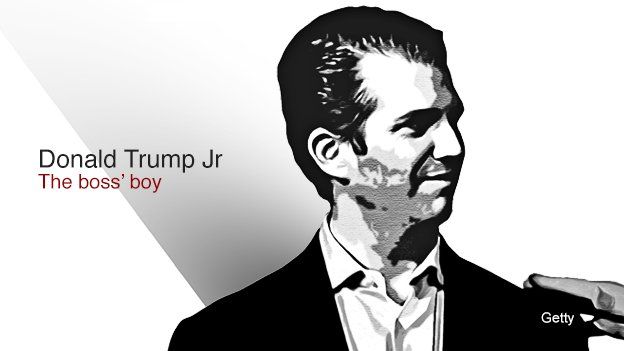
Who was he? The president's eldest child, who it emerged met some questionable Russians.
Key plot line Donald Trump Jr's role in this unfolding saga all came down to a meeting he had with a Russian lawyer, which was set up by a music publicist (the full details of which come out in Season Three). If it sounds random, then in many ways it is.
The publicist, Rob Goldstone, offered Trump Jr a meeting with lawyer Natalia Veselnitskaya, promising him dirt on Hillary Clinton.
This meeting was the key to much of our plot line because it raised several key questions. Did this amount to the campaign colluding with a foreign government? Why did he agree to the meeting?
What happened at the meeting was the scene investigators played over and over again as they tried to work out if there was any impropriety. In the end, no collusion charges were brought.
Read more: Trump Jr's habit for making headlines
Season Two - The Transition
Donald Trump confounded his critics by winning the presidency. But the transition was as gripping as the season before it as Trump picked his cabinet, introducing key characters to the mix.
The season ended with Trump taking the oath of office on a cold January morning - but there were more twists to come.
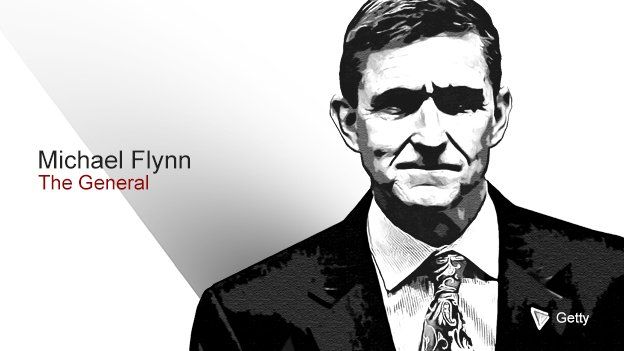
Who was he? The granite-faced former general who later became the shortest-serving member of Donald Trump's cabinet. He resigned after not being honest about his contact with a Russian official - and was later charged with making false statements to the FBI.
Key plot line Flynn was appointed national security adviser just days after the election, against the advice of then-President Obama, who warned Trump not to hire him. Flynn's starring role came in December 2016, just before Trump was sworn in, when he spoke to the Russian ambassador, Sergei Kislyak.
The Washington Post and New York Times said the men discussed Russian sanctions, and that Flynn later lied to the Vice President Mike Pence about the conversation (Mr Kislyak says the men discussed only "simple things").
The substance of those talks eventually led to Flynn being prosecuted as part of the investigation led by special counsel Robert Mueller.
At the end of Season Three, in December 2017, Flynn pleaded guilty to making "false, fictitious and fraudulent statements" to the FBI about what he and Kislyak discussed.
With that, the investigation reached Trump's inner circle.
Read more: Out after 23 days - who is Michael Flynn?
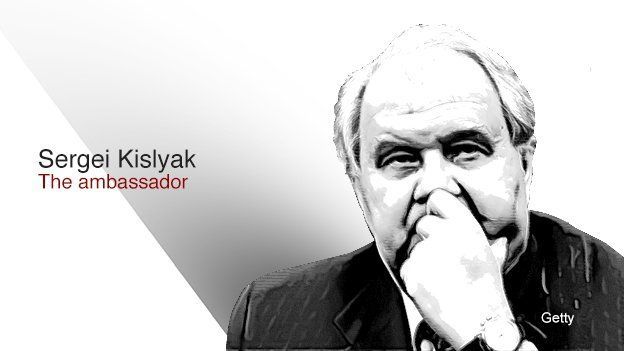
Who was he? Many roads in this drama led back to Sergei Kislyak, the jolly and charismatic figure, who up until July 2017 was the Russian ambassador to Washington.
Key plot line Kislyak's role in this drama remained unclear up to the end - but many of the players in this drama had meetings with him, and that put them in awkward spots.
The key questions for investigators were: why were they drawn to him, and what was said? The Russian ambassador spoke to both Flynn and Attorney-General Jeff Sessions - meetings which both Trump officials didn't initially acknowledge took place.
Anything else we should know? Well, Russia fiercely fought back against claims on CNN that Kislyak was a "top spy and recruiter of spies".
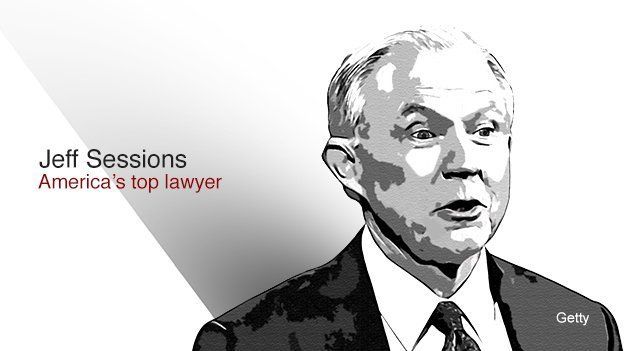
Who was he? Jefferson Beauregard Sessions III hovered in the background during Season One, when he was an Alabama senator and a trusted Trump adviser, but we really got to know him during Season Two, when he became Trump's nominee for attorney general, a job he kept for almost two years.
Key plot line Sessions was one of several Trump aides to meet Russian ambassador Sergei Kislyak, and question marks emerged over the nature of those meetings.
When the FBI investigation focused on the Trump campaign, Sessions stood down from the inquiry, much to Trump's irritation.
That decision to step down dogged him to the end, and he was written out of the series close to the end of Season Four, when Trump forced him to resign.
That move put control of the Mueller investigation into the hands of a Trump loyalist.
Read more: An attorney general dogged by scandal
Season Three - The Presidency
This was where the drama really picked up and all the plot lines came together. A lot of the background characters we saw in Season One came back with a vengeance and the infighting got nasty - and this is when the police started circling.
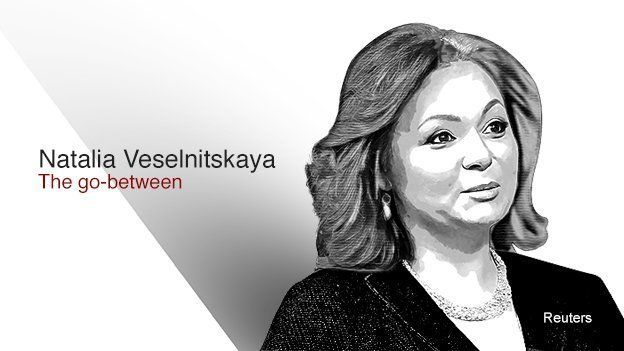
Who was she? A Russian lawyer with a fearsome reputation who fought against US restrictions on Russia. But was she a Kremlin stooge?
Despite earlier denials, she admitted in April 2018 to being an "informant" for Russia's prosecutor general.
Key plot line Hers was a small but crucial role - she's the one who Manafort, Trump Jr and Trump's son-in-law Jared Kushner met in June 2016, the details of which begin trickling out a year later in a flashback sequence.
She said the meeting was to discuss adoptions - but those who helped set it up said she was offering dirt on the Democrats and Hillary Clinton's campaign.
While the meeting became a central plot point, whatever happened inside never actually led to any charges.
That meeting would never have happened without...

Who were they? Emin Agalarov is Azerbaijan's biggest pop star, of course. Have you not heard Love is a Deadly Game? Emin helped bring Donald Trump's Miss Universe competition to Russia and the two are close enough to send each other birthday messages. His dad, Aras, is a billionaire who mixes in the highest circles of influence in Moscow.
Key plot line Again in a flashback scene, we met Emin as he set the wheels in motion on that Trump Jr meeting.
An email sent to Trump Jr suggested Emin was offering information on the Democrats (Emin said he wasn't). The email also said Aras Agalarov had apparently met the "crown prosecutor" of Russia - a role that weirdly didn't exist - and got information on Hillary Clinton.
Are you keeping up?
Read more: The tough-talking networker
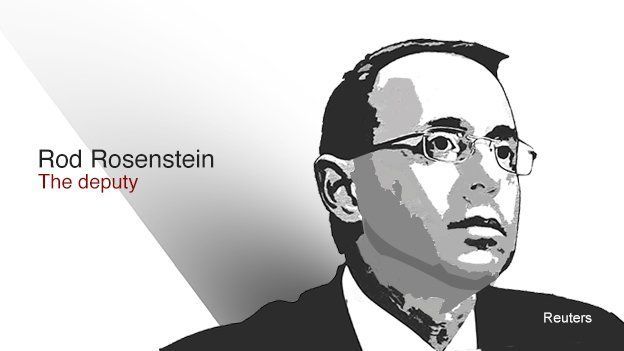
Who was he? He became deputy attorney general under Jeff Sessions. In the TV drama of the Russia scandal, this is the sort of role that would go to a solid Broadway actor you recognise but can't put a name to.
Key plot line When Sessions stood down from leading the main investigation into the Trump-Russia ties, it fell to Rosenstein to do that job. In a major plot development, he appointed a special investigator - not a popular move with the White House.
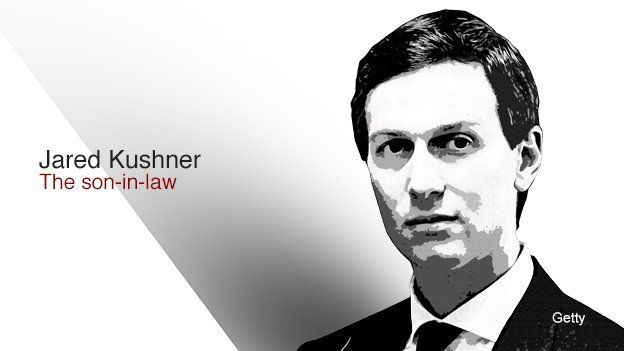
Who was he? Married to Trump's daughter, Ivanka, Kushner was the character who was seen but very rarely heard.
Key plot line Amid cries of nepotism, he was given a plum White House job as senior adviser to the president with a wide-ranging portfolio. It was his contacts with the Russians during the election campaign and beyond that led investigators to circle him.
In June 2016, Kushner attended THAT meeting with Donald Trump Jr and the Russian lawyer. He said he was so bored he messaged his assistant to call him so he could leave.
Kushner was also another character who had repeated contact with Russian ambassador Sergei Kislyak - contact that he initially failed to disclose.
Source : BBC News